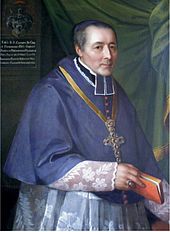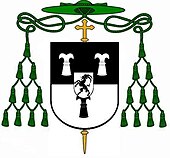Kaspar de Carl from Hohenbalken
Kaspar de Carl ab Hohenbalken (born March 27, 1781 in Tarasp , Lower Engadine , † April 19, 1859 in Chur ) was a Roman Catholic bishop of the diocese of Chur .
Life
The son of Johannes Carl von Hohenbalken and Ursula Thöni attended high school in the Benedictine Abbey Marienberg in Vinschgau in Pfunds am Inn and in Hall in Tirol . After graduating from high school, he studied philosophy at the University of Innsbruck and theology in the seminary in Brixen . On October 6, 1804, he appeared as an alumnus in the priest's house in Merano and received on 30 December 1804 in the seminary chapel in Merano the priesthood . Initially repetition at the seminary in Merano and parish vicar, he was expelled from the Bavarian government of the Tyrolean country in 1807 together with the Chur bishop Karl Rudolf von Buol-Schauenstein . In 1808 he became professor of rhetoric at the St. Luzi seminary in Chur and received a teaching position in moral theology and canon law . In 1831 he took over the management of the seminar as Regens , which he held until 1844. As early as 1826 he was appointed to the cathedral chapter of Chur; First Domsextar was, he 1826-1841 domkustos and 1841-1844 dean .
On January 27, 1843 Pope Gregory XVI appointed him . as coadjutor of Bishop Johann Georg Bossi von Chur, severely handicapped by a stroke, and at the same time titular bishop of Hippos . The episcopal ordination donated to him on November 19, 1843 Girolamo D'Andrea , the apostolic nuncio in Switzerland. On January 9, 1844, he became Bishop of Chur. After numerous disputes about the denominational character of the canton school, the Chur bishop moved the Catholic canton school to the college of Maria Hilf in Schwyz . In 1852 the bishop signed a contract with the city that incorporated the Churer Hof into the city of Chur. In 1857 there was another agreement with Glarus on its provisional integration into the diocese of Chur. During his term of office, a number of new monasteries and religious branches were founded in the Diocese of Chur, which in addition to schools also looked after hospitals, orphanages and old people's homes and took on outpatient care in many places .
In order to be able to cope with the numerous pastoral tasks, he asked Rome for an auxiliary bishop in 1858 . He proposed his appointed vicar general Albert von Haller in 1855 . Rome complied with his wish and appointed Haller on March 18, 1858 auxiliary bishop in Chur. The Bishop of Basel , Karl Arnold-Obrist , donated his episcopal ordination on June 29, 1858 in the collegiate church of the Benedictine Abbey of Einsiedeln , but Haller died on November 28 of the same year.
Bishop Kaspar de Carl ab Hohenbalken died on April 19, 1859 in Chur and was buried in the bishop's grave in the Cathedral of St. Mary of the Assumption .
literature
- Leo Ettlin: Carl, Kaspar de (von Hohenbalken). In: Historical Lexicon of Switzerland .
- Erwin Gatz (ed.): The bishops of the German-speaking countries 1785/1803 to 1945. A biographical lexicon. Duncker & Humblot, Berlin 1983, ISBN 3-428-05447-4 , pp. 92ff.
- Hans Bruppacher: The Carl von Hohenbalken. In: Bündner Mitteilungsblätter 1937, pp. 218–252.
- Iso Müller: The Episcopal grammar school in Disentis 1850-1856. In: Bündner Mitteilungsblätter 1970, pp. 1–63.
Web links
- Entry on Kaspar de Carl from Hobenbalken on catholic-hierarchy.org ; accessed on November 15, 2016.
- The portraits of the Chur (prince) bishops in the knight's hall of the Episcopal Palace in Chur - Kaspar de Carl from Hohenbalken 1844–1859 ( Memento from November 11, 2013 in the Internet Archive )
Individual evidence
- ↑ Hierarchia Catholica Medii et Recentioris Aevi. Volume 7, pp. 170, 215
- ^ Albert Fischer: Kaspar de Carl from Hohenbalken 1844-1859
| predecessor | Office | successor |
|---|---|---|
| Johann Georg Bossi |
Bishop of Chur 1844-1859 |
Nikolaus Franz Florentini |
| personal data | |
|---|---|
| SURNAME | Carl ab Hohenbalken, Kaspar de |
| ALTERNATIVE NAMES | Carl von Hohenbalken, Kaspar de |
| BRIEF DESCRIPTION | Roman Catholic Bishop of the Diocese of Chur |
| DATE OF BIRTH | March 27, 1781 |
| PLACE OF BIRTH | Tarasp , Lower Engadine |
| DATE OF DEATH | April 19, 1859 |
| Place of death | Chur |

